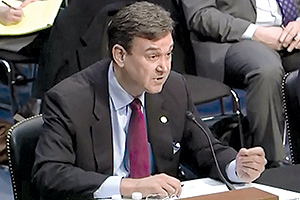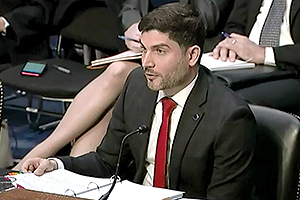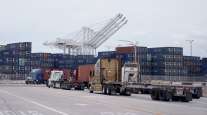Senior Reporter
Senator, USDOT Officials Highlight Rural Transportation Needs

[Stay on top of transportation news: Get TTNews in your inbox.]
The next set of guidelines Congress approves for the country’s highway programs must improve roadways across rural corridors, Nebraska Republican Sen. Deb Fischer said during a Commerce Committee hearing Jan. 28.
Fischer emphasized the need for improving the way states’ access federal support for rural programs to enhance freight and commuter connectivity.
As she put it, “To ensure we have the infrastructure we need for the future, U.S. transportation policy should focus on both improving the infrastructure we currently have and building new assets to accommodate increasing demand.”
In part one of a two-part exploration of autonomous technology today, our latest RoadSigns podcast revisits conversations with CEOs Alex Rodrigues of Embark and Cetin Mericli of Locomation. Hear them explain what testing automated trucks and developing platooning technology has taught them about the road ahead — and get new perspective with host commentary. Listen to a snippet from Rodrigues above, and to hear the full episode, go to RoadSigns.TTNews.com.
Infrastructure is particularly important this year as the committee considers the reauthorization of important federal surface transportation programs, added Fischer, chairwoman of the Transportation and Safety Subcommittee.
Last year, Fischer’s colleagues in the Senate approved a five-year measure with the aim of modernizing aspects of the nation’s highway system, seeking to respond to climate change, and further streamlining the environmental permitting process.
The Commerce Committee, which has jurisdiction over freight policy, has yet to schedule consideration of its section of the FAST Act reauthorization. That 2015 highway law expires in September.
Led by Transportation Secretary Elaine Chao, the Department of Transportation launched in October the Rural Opportunities to Use Transportation for Economic Success, or ROUTES, initiative. Designed to improve connectivity across rural places, the initiative also seeks to enhance access for grant funding and loan programs, data sharing, and public transit. According to DOT, two-thirds of rail freight begins in rural areas, and about half of truck vehicle-miles-traveled takes place on roadways across rural corridors.

Under Secretary of Transportation for Policy Joel Szabat (U.S. Senate Committee on Commerce, Science & Transportation)
“This administration has placed considerable emphasis on underserved communities like those in rural America. We have met and exceeded our obligation regarding rural transportation in the 2015 FAST Act, and we continue pressing forward with new ways to improve rural mobility,” acting Under Secretary of Transportation for Policy Joel Szabat and Build America Bureau Executive Director Morteza Farajian told Fischer’s subcommittee.
In their joint statement, they went on, “ROUTES will provide rural areas with user-friendly information to improve planning and development of grant applications. It will also give projects in rural communities due consideration in grant programs, to assist in meeting their transportation needs.”

Build America Bureau Executive Director Morteza Farajian (U.S. Senate Committee on Commerce, Science & Transportation)
The department recently sought public input for the ROUTES initiative. Specifically, DOT called for comments concerning “data pertaining to current unmet needs in rural transportation, barriers rural communities face in addressing these transportation needs, stakeholders’ experiences with applying to and using DOT discretionary grant and credit programs,” according to a notice in the Federal Register.
Providing feedback was the National Association of Counties, which indicated: “Increased federal funding to rural areas through flexible, discretionary grant programs will allow counties to invest in badly needed safety countermeasures that they may currently lack, a significant factor that is critical to decreasing the disparate number of individuals killed on rural roads.”
“Sustainability and resiliency must be considered as integral to rebuilding our nation’s infrastructure. To prepare for the future, all communities should include systemwide life-cycle cost analysis as part of every new or renewed infrastructure project, and emerging technological advances must be properly incorporated to enhance personal mobility,” added the American Society of Civil Engineers, which issued the country’s overall infrastructure a near-failing grade in 2017.
A senior official will be tasked with reviewing the public comments, according to DOT. Over the years, trucking executives have called on congressional transportation policymakers to advance programs designed to improve freight access, mobility and connectivity.
Want more news? Listen to today's daily briefing:





